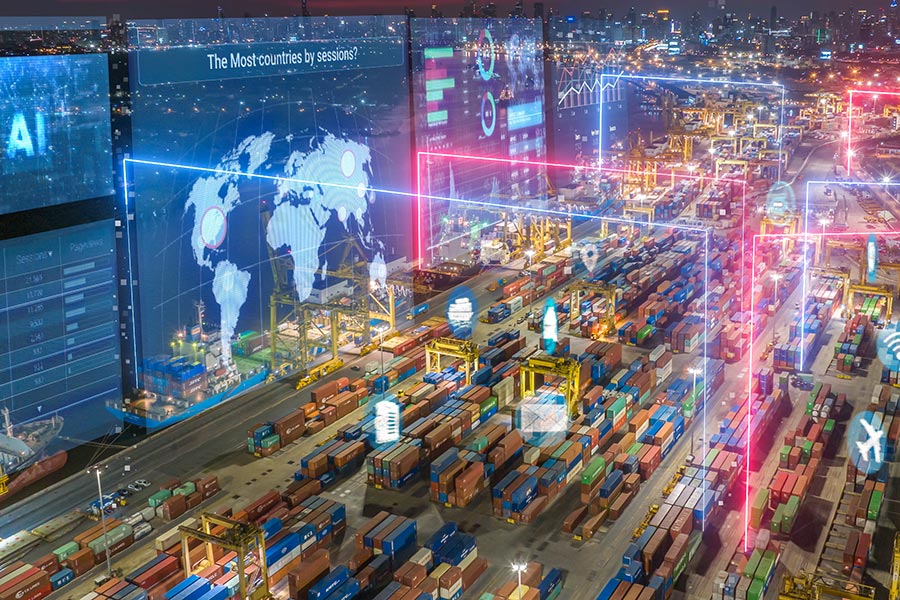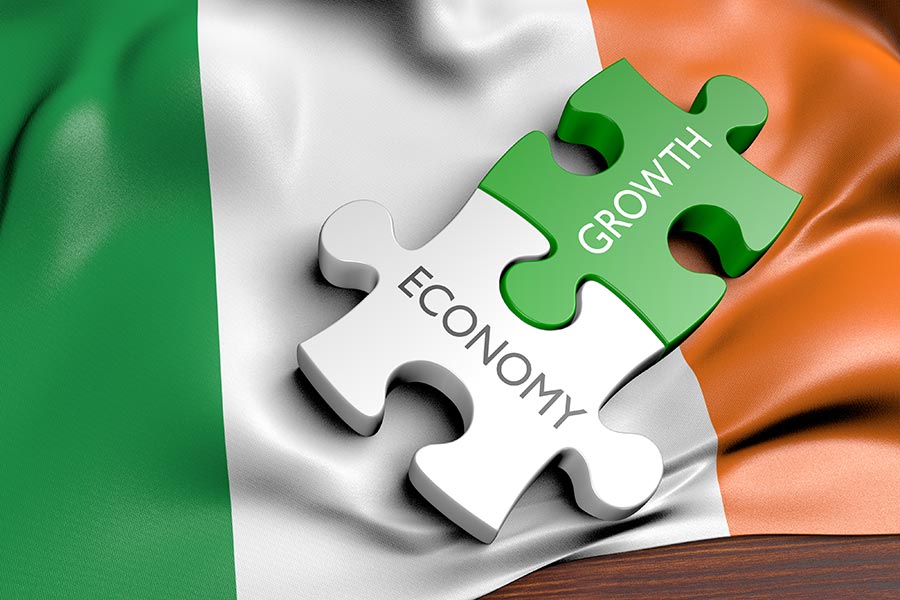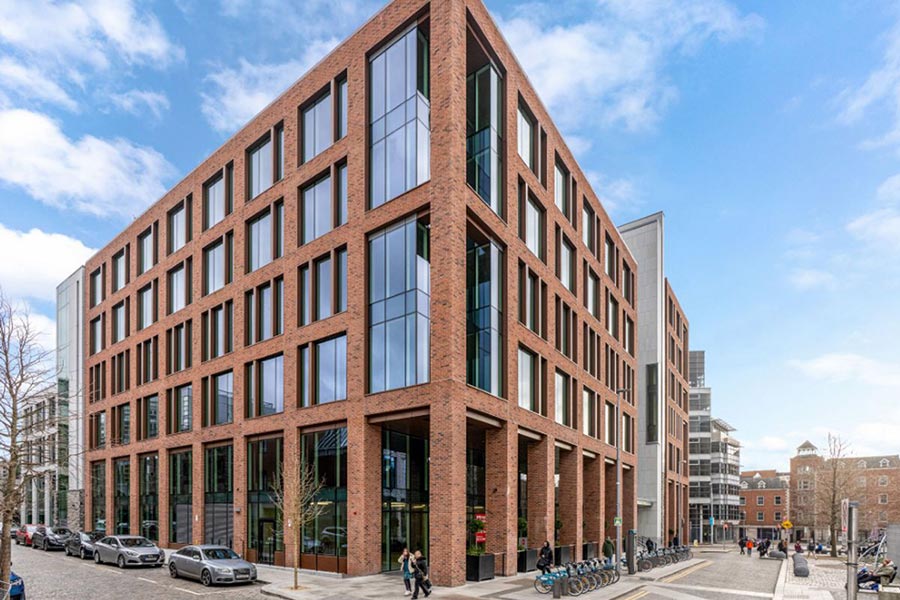The Taoiseach has warned TDs that there will be no return to normality as US president Donald Trump announced sweeping tariffs of 20% on imports from the EU, write Craig Hughes and Brian Mahon.
Fianna Fáil leader Michéal Martin told his party “we’re not going to get to a stage where we’re back at the status quo”, in the hours before Mr Trump ignited an unprecedented global trade war.
While the Government was relieved Ireland wasn’t specifically singled out, Mr Trump sent an ominous message on our multibillion pharmaceutical industry as he finished his rambling, hour-long speech in the White House Rose Garden yesterday.
“The pharmaceutical companies are going to come roaring back... They’re all coming back to our country, because if they don’t, they’ve got a big tax to pay.
“And if they do, I’ll be very happy,” Mr Trump said.
He did not mention specific measures on the pharma sector, but a 20% tariff was placed on the EU as part of sweeping global trade levies.
After Mr Trump’s speech last night, the White House issued a statement saying that “some goods will not be subject to the reciprocal tariff”, which crucially included pharmaceuticals.
Exceptions also apply to: steel/ aluminium articles and auto parts, copper, semiconductors, and lumber articles, bullion; and energy and other certain minerals that are not available in the United States.
The statement said that the 20% rate on the EU will come into force on April 9.
After Mr Trump’s speech, the Taoiseach said that Ireland believes in open and free trade and that the imposition of tariffs was bad for the world economy.
He remarked: “I deeply regret the US decision to impose 20% tariffs on imports from across the European Union.
“We see no justification for this. More than €4.2bn worth of goods and services are traded between the EU and the US daily.”
He said that disrupting this deeply integrated relationship “benefits no one”, adding: “Tariffs drive inflation, hurt people on both sides of the Atlantic, and put jobs at risk.”
He said that the Government and the EU would now “reflect’ on how best to proceed.
“As I agreed with President [Ursula] von der Leyen in our recent phone call, EU unity is crucial, and our response should be considered and measured.
“Any action should be proportionate, aimed at defending the interests of our businesses, workers and citizens.”
Mr Martin said now was a “time for dialogue”, and that he believed that a negotiated way forward is the only sensible one.
“A confrontation is in no one’s interests. Ireland will be a strong advocate for an outcome which enhances the existing and strong transatlantic trading relationship.”
He added: “Ireland’s priority is the protection of jobs and our economy. We are starting from a position of strength, and our economy is resilient.
“It is important that we focus on factors that we can control, including improving our competitiveness and investing in infrastructure. By working with Irishowned companies, multinationals, our EU partners and bilaterally with the US, we can and will weather this storm.”
One Cabinet minister said last night that there was “relief that we weren’t singled out as a country”.
But Minister of State for European Affairs Thomas Byrne told Virgin Media in the aftermath of Mr Trump’s speech: “I don’t think his plan will work, but make no mistake this is very bad for Ireland.
“This could be the start of a complete change in how the world economy has worked for the last decades and it is hard to mitigate against that… we need to continue to work with our American friends about what they will suffer from these tariffs…
“There’s still a huge air of uncertainty especially with the offer from President Trump to discuss these tariffs.”
In his ‘Liberation Day’ speech, Mr Trump said that it was “one of the most important days in American history” describing it as “our declaration of economic independence”.
“For decades, our country has been looted, pillaged, raped and plundered by nations near and far, both friend and foe alike,” the US president said.
Mr Trump said that Americans have watched on as foreign leaders “stole our jobs” but he was bringing them back to the US.
“Our taxpayers have been ripped off for more than 50 years but it’s not going to happen any more.
“We are finally going to make American great again, greater than ever before,” he said.
He remarked that the pharmaceutical companies “are going to come roaring back” after earlier saying that the US “can no longer produce enough antibiotics to treat our sick, if anything happened from a war point we wouldn’t be able to do it”.
He also noted that a number of pharmaceutical and technology companies with bases in Ireland had confirmed multibillion investments in America already as a result of his proposed tariffs.
He said that Apple, who have their European headquarters in Cork, would invest $500bn, with Johnson and Johnson investing $50bn and Eli Lilly was investing $27bn.
He also said that Meta, who also has their EMEA base in Ireland, would invest $500bn.
“Jobs and factories will come roaring back into our country, you can see it already…. We will pry open foreign markets and foreign trade barriers…. It will mean lower prices for consumers. This will be the golden age for America,” Mr Trump said.
He declared “We are finally putting America first.”
Chair of the Irish Fiscal Advisory Council, Seamus Coffey, told Virgin Media that “there is still some level of uncertainty” about when the 20% tariff on the EU will come into force.
Earlier, the Taoiseach left his Fianna Fáil TDs and senators stunned when he delivered an “ominous” update on the impact of the looming tariffs.
One party source at the meeting said that the Taoiseach said the country was heading into a “different situation” and would not be able to return to normal.
“The Taoiseach told us that ‘we’re not going to get to a stage where we’re back at the status quo’”.
“The room went silent. Then the bells rang for a vote and we went to the Chamber stunned,” the source said.
The Taoiseach told the meeting that they were facing into a 20% blanket tariff along with specific sectoral tariffs, which tallied with Mr Trump’s announcement.
The US calculated that the EU is charging the US 39% in tariffs, but this includes VAT which is a sales tax on all goods not just those from the US.
“The EU are very tough traders. I know you think EU very friendly, they rip us off. We’re charging them essentially half,” Mr Trump said.
Mr Trump took aim at Ireland’s bulging multinational pharmaceutical industry saying he wanted to “take it back” to the US during the Taoiseach’s visit to the Oval Office last month.
Large swathes of US multinationals have operations in Ireland to avail of our 15% corporation tax rate, which has meant they pay little or no tax in the US.
The Government had already been on high alert prior to Mr Trump’s January inauguration when his now commerce secretary Howard Lutnick year pledged in October to attack Ireland’s trade surplus which is built on the back of corporation taxes of US multinationals.

Simon Harris had warned ministers about the integrated nature of supply chains between Ireland and our biggest trading partner, the US.
Ministers were told that 32% of the goods we export go to the US and it provides 17% of our imports.
Around 80% of Irish exports to the US are medicinal and pharmaceuticals.
The Cabinet was told that a 20% tariff by the US and a reciprocal 20% measure by the EU would result in exports of pharmaceuticals and chemicals from Ireland to the US declining by about half.
Ireland imports about €6bn worth of pharmaceutical goods each year, most of which are ingredients for drug products used by the multinational pharma sector based here.
Mr Harris will travel to Luxembourg on Monday for a meeting of EU Trade ministers, with the EU Commission set to take several weeks to calibrate its response and the level of reciprocal tariffs it will introduce.
The Taoiseach told the Dáil that the “old order is changing” and that the tariffs will have serious consequences.
He said: “This is, without question, the most serious issue to face the Irish economy in a long time, and it’s clear that the scale of these tariffs will be very, very significant in European terms.”











